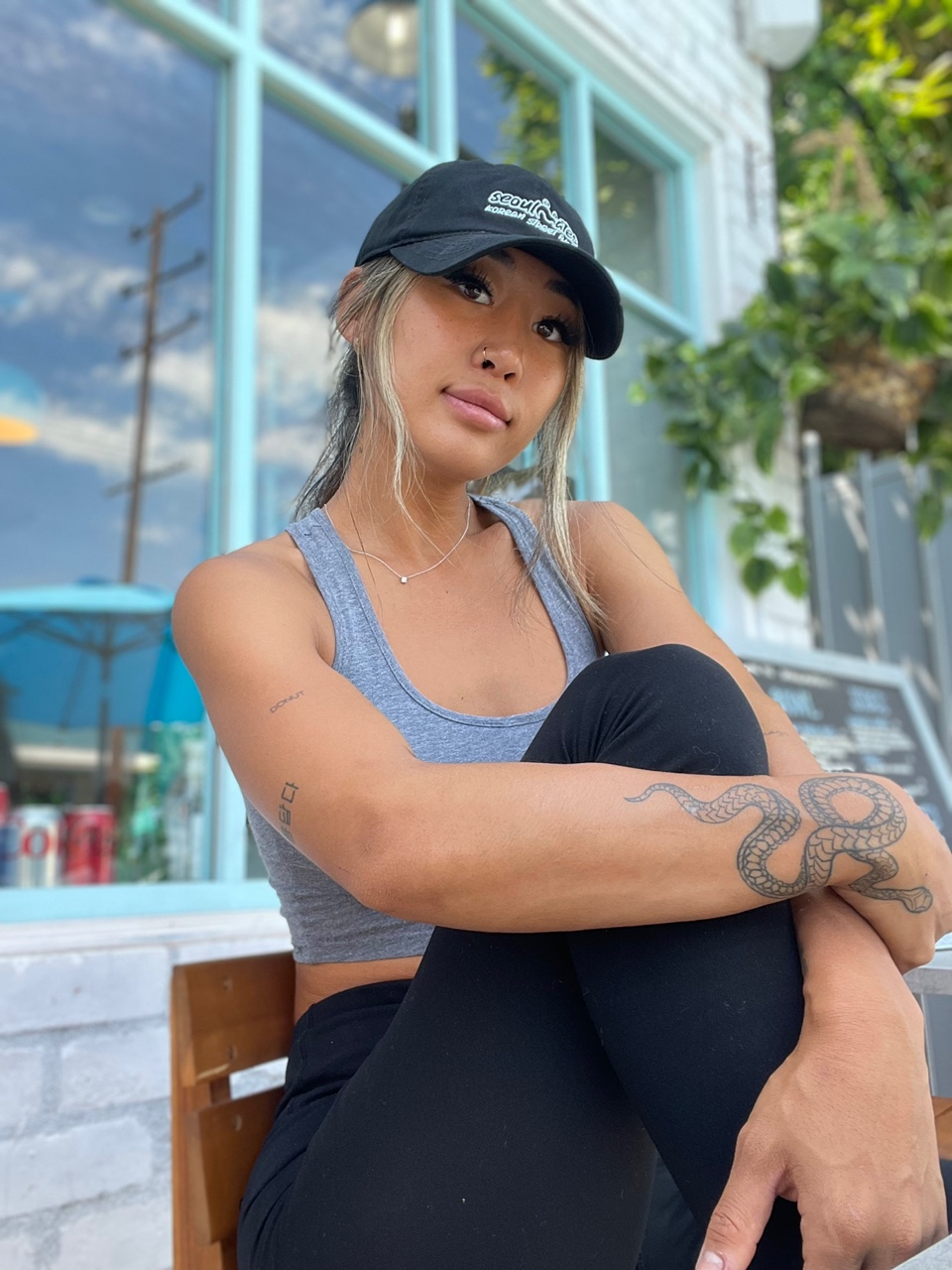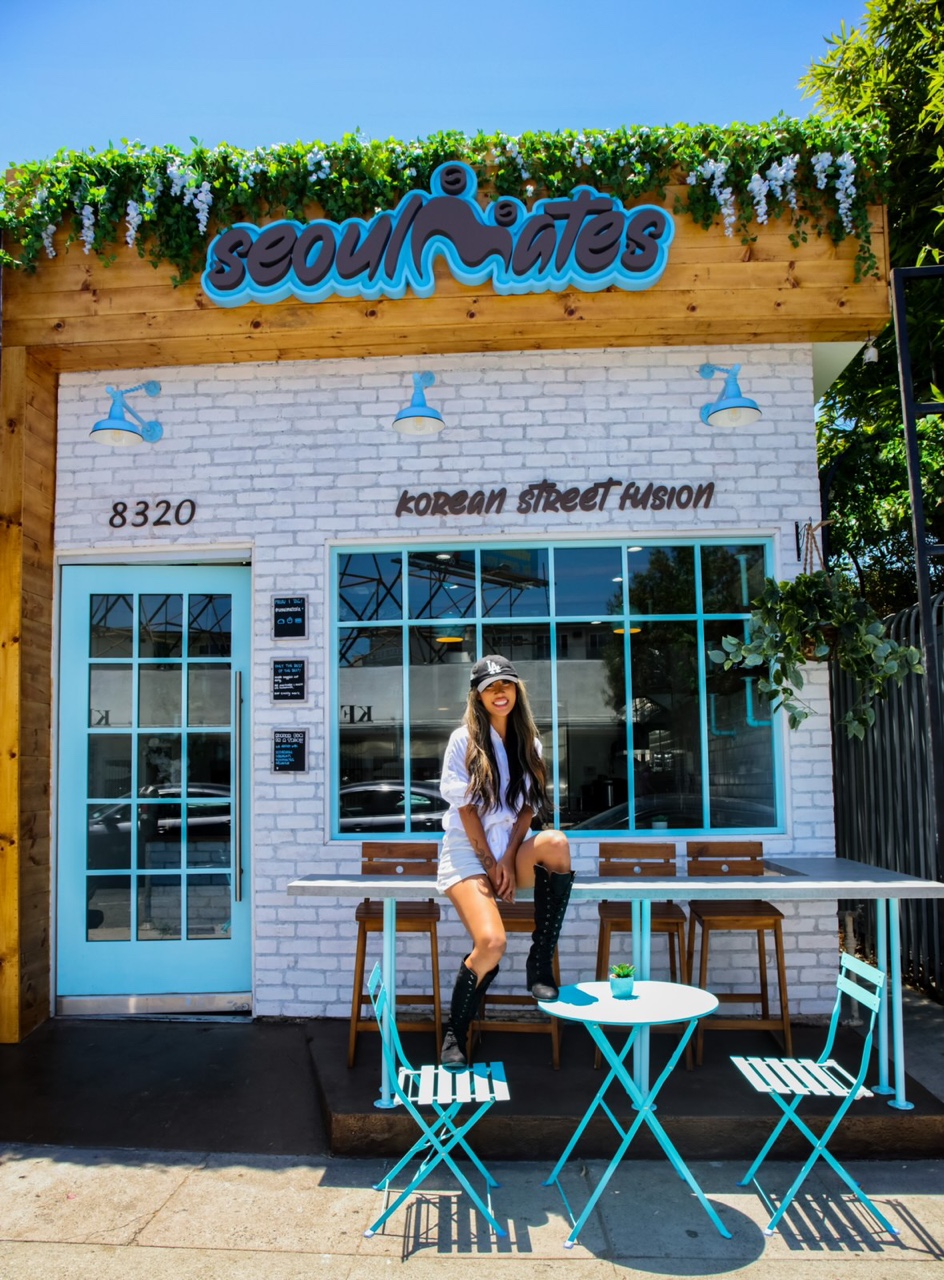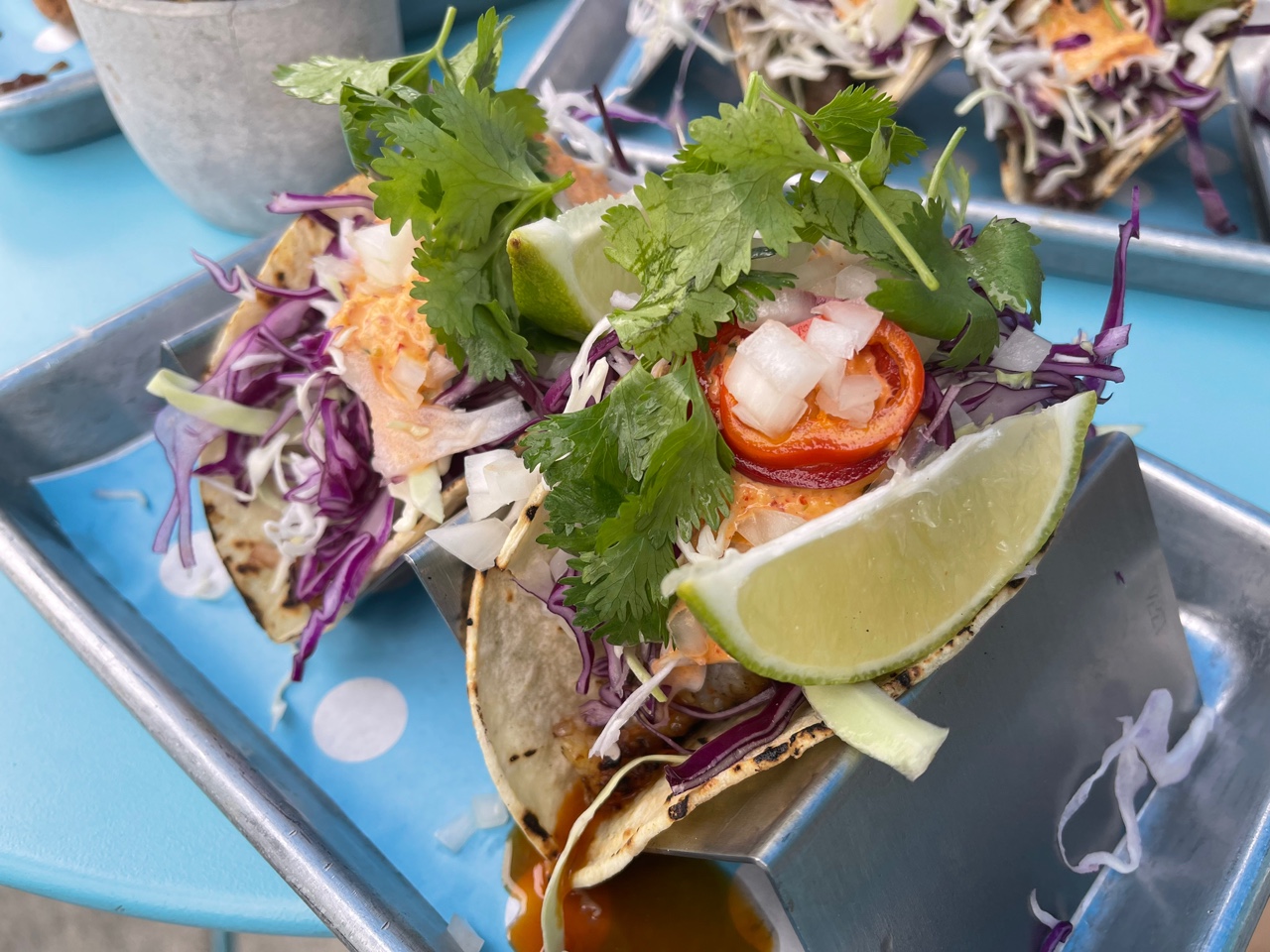Overseas Koreans Platform
- Main page
- Overseas Koreans Platform
- News Room
News Room
- Main page
- Overseas Koreans Platform
- News Room
- Country
- United States
- Date
- 2022.12.19

Christina Hong, the Founder of Seoulmates
We met with Korean American Christina Hong, the founder of Seoulmates, a taco restaurant with Korean recipes.
Please introduce yourself.
My name is Christina Hong and I’m from Chicago. My parents are first-generation immigrants from Korea, and I have a brother and a sister.
Did you experience Korean food at your home for the first time?
Yes. When our family first came to the United States, both of my parents worked. But after a while, my dad would work while my mom stayed at home. That’s when she would cook us traditional Korean food. Our breakfast, lunch, and dinner were all Korean dishes. Of course, she did sometimes cook us American plates.
My mom was a really good cook, and I think I’m lucky to be her daughter. Korean food is healthy, and we got to eat something unique in the U.S. My mom didn’t buy her food at the market. She made her dishes from scratch at home.
Then when did you start cooking Korean food yourself?
When I got into college, I started to really miss my mom’s cooking. So, I called her up and asked her how to make the Korean food I used to eat. For the first time in my life, I started following Korean recipes inside the apartment I used to live in while I was in college, asking my mom questions like, “how much do I have to put this one in?” And she would answer like your typical Korean mom and say, “you know, just enough.” She would tell me, “put this one in, or that one.” That’s how I got to start cooking Korean food, by living away from my mom and missing her Korean dishes.
How did you open up your restaurant?
I majored education in college. But at the end of my senior year, I realized that I had never wanted to be a teacher. What I wanted was to open up a restaurant. When I shared what I had in mind to my parents, they said, “Christina, you’ll be graduating in just three months.” They told me I should graduate and then think about it.
My classmates were looking for jobs as teachers after graduation. But I didn’t even try to find a job. Instead, I started working as a bartender. That was about ten years ago. How could a woman in her twenties who had just graduated from college find the money to open a restaurant? That’s why I worked three jobs, as a bartender, babysitter, and another one, to gather the funds to open my restaurant, working 80 whole hours a week. I saved up all the money that I earned.
At the time, my parents were running a shoe store and a smoothie shop, but they sold them and were looking for a new business. After a while, they finally decided to settle with the franchise, ‘Charley's Philly Steaks.’ The franchise had a Korean as its CEO with several branches, and my parents wanted to open one in Chicago. But they didn’t have enough money to open a branch even after selling all their stores. So, they asked me, “we don’t have enough money, but you have some money, right? Could you invest in our business?” That’s what they asked me.
I had saved up for five years by then. Right after hearing what my parents said, I thought, “then what about my restaurant?” But my parents had found success on their own in the states, coming all the way from Korea, and they were hard-working people. My mom was my closest friend as well. So I said “yes” to their request and gave them all the money I had.
As it turned out, the restaurant was a huge success, and I worked as the manager. Two years later, we opened up our second and third branches in Chicago. The restaurants are still doing well. With the success of the restaurants, I could save up money again. And so, after dreaming for ten years of opening a restaurant for myself, I could finally realize my dream by coming to Los Angeles.
Why did you choose western LA for your business?
I always wanted to open a restaurant in LA. Because it’s such a beautiful city. LA is a big city, and western LA is my favorite place out of all the districts here. I live there as well.
There are a lot of Korean restaurants in the Korea Town of LA, but there wasn’t a single one around west LA. That was why I wanted to bring the flavor of Korean food to the region and my neighbors.
Could you tell us the process of opening your restaurant?
I had finally made up my mind to leave my parents and start my own restaurant,
but the pandemic of COVID-19 struck the world. That was certainly not a good time to open up a restaurant. I had a lot of free time, so I started making samples out of various recipes because I thought I’d be opening a restaurant very soon. After a few experiments, I made ‘Bulgogi Hoagie,’ a bulgogi sandwich dish. Bulgogi Hoagie is still on our menu of Seoulmates.
I got to know a place called Verdugo Bar in Glendale through a friend of mine and took my dishes there to sell them at the bar’s pop-up store.
The owner of the bar had a taste of my sandwich and went, “Oh my god. This so good.” In fact, I was really lucky at the time because Verdugo Bar mostly sold liquor. So the bar couldn’t stay open during the pandemic as it wasn’t designated as an essential business. However, restaurants serving food were seen as essential businesses. The bar had to serve food to stay open. That's why i could sell Bulgogi Sandwiches at the bar for 2 years during the pandemic. Also, I got to feature my sandwich in various other bars too,
which helped a lot of people taste my food. All the people who had my sandwich were in love with it and urged me to open a restaurant. That’s when I made up my mind and thought, “Now is the time for me to open a restaurant.”
When did you open your restaurant?
At the end of July this year. It hasn’t even been two months since our opening, so it’s a fresh business.

A while ago, we found an article on Seoulmates in a daily newspaper called ‘The Orange County Register.’ Your restaurant is in LA, so how did a reporter from The Orange County Register come all the way to write a report on your store?
We have a marketing team to contact with food journalists. But the renowned media companies such as ‘Eater LA,’ and ‘The Orange County Register’ called us first and wrote reports before we had even thought of getting to them. We asked how they found out about our restaurant, and they said, “we heard a lot of people talking about your restaurant.”
The locals often visit our restaurant and spread the news to their friends, making those friends talk about our restaurant again to their acquaintances. That’s how our advertisement works. The articles helped us a lot too, of course. All in all, more and more people are coming here to try out our food.
Who are the main customers of Seoulmates?
The customers here are very diverse. There are a lot of Asian Americans here. Of course, Koreans are part of those customers, but Asians with various cultural backgrounds visit our store, including Chinese, Filipino, Vietnamese Americans.
In my opinion, Asian communities in general love Korean food and has a lot of respect for Korean cuisine. Of course, us Asians all deeply respect each other’s food and dining culture. When I traveled to Southeast Asia, I had a chance to taste the food of various countries, like Taiwan and Vietnam. I began to think that Asians have a deep understanding of each other’s cooking.
But lots of other Americans visit us too. A wide range of cultural groups in America, such as European Americans and Hispanics come here to try out our food.
Are there a lot of Korean customers here as well?
Of course. Whenever Koreans come here, I know they’re Koreans right away. That’s why I always ask them if the food is good. Galbi and bulgogi are traditional Korean food, but at Seoulmates, they’re cooked as tacos, which is far from traditional recipe, making me wonder if my dishes suit the taste of Koreans.
As you can see, coming up with a Korean fusion recipe isn’t easy. I tried a lot of other ways to make fusion recipes for Korean cuisine. I’m very picky when it comes to food, which is why I threw everything away even after making various dishes when I thought to myself, “There's no essence of Korean food in this dish.” That is why I always ask Koreans if they liked the food. And they went “Oh my god! Your food is incredibly good.” Of course, feedback from other ethnic groups is important too, but I appreciate positive comments from Koreans because they feel like a sign of approval and verification for my food. I can only be thankful for their support.
How do you make the Kimchi Remoulade that goes inside your sandwiches and tacos? And how did you come up with such a recipe?
The Kimchi Remoulade is pretty much a Kimchi aioli. As you know, aioli is a sauce of mayonnaise mixed with garlic. The Kimchi Remoulade is the result that I achieved after meddling around with various Korean ingredients.
Kimchi itself has a very strong flavor, but now there are a lot of people in mainstream American society who know and eat kimchi. However, for Americans who have never tasted kimchi before, the dish might be hard to approach. I wanted those people to experience the smell of kimchi. Rather than approaching them with kimchi itself, I mixed it with ingredients that are familiar to them to relieve the dish’s strong smell. As it turns out, people love my new method. I believe the Kimchi Remoulade is like the open gate for the American people on the road to kimchi with stronger smell.
Is your business doing well?
Yes. I truly am a lucky one. My friends used to tell me that I need an investor or that I should have a business partner. But what I wanted for Seoulmates was to open it myself without the help of anybody else.
It was a huge challenge as it was right after the pandemic, but I’m really glad that I pushed through by myself and my struggle was all worth it. The business is doing much better than I ever expected, and it’s getting even better every day.

Tell us about your menu here.
First, you have your tacos. The tacos have galbi, bulgogi, and Korean fried chicken as their filling. I think most people are full after having about three as a meal. Next up is the sandwich. Here, we call sandwiches as ‘Hoagies.’ If you want a Korean dish that’s more traditional and classic, we have a bowl of bibimbap or kimchi fried rice.
There are vegan dishes for vegetarians as well. There are a lot of vegetarians around this area, and our vegan dishes are certainly gaining their attention. The vegan tacos are made out of mushrooms and jackfruits, and the kimchi fried rice can be served as a vegetarian menu as well with no Spam. In conclusion, the menu you’ll find in Seoulmates is a traditional Korean flavor that you won’t be able to find in a Korea Town.
Although Seoulmates was your first restaurant, it seems you wouldn’t have had much fear in opening a business because you had a lot of practice as a manager of your parents’ store and as the owner of a pop-up restaurant.
No, that’s not true. I was so afraid when I started out. In fact, it was the scariest thing that I've ever done in my whole life. I did a lot of things that normal people wouldn’t do, like traveling Southeast Asia alone for two months, and I had no sense of fear while going through such an experience.
But opening a restaurant was the scariest thing I ever went through. That’s because I invested everything I had in it. If the restaurant didn’t go well, I would have lost everything I had. You can see how the business was full of risks for me.
It was a completely different story to opening a restaurant with my parents. I worked as a manager for a franchise branch, which meant the business had already been verified. The brand already had 400 branches, meaning success was guaranteed as long as we followed a few rules.
On the other hand, even though I’m in my third year living in LA, two years of that period was during the pandemic. I did become familiar with the region, but I still don’t know LA as much as I know Chicago. That’s why LA is still a new location for me, and I don’t think that I am well aware of my customer base.
But whoever the customers are, they’re still people, and I have my ideas on what would work for them. A few people told me that they liked my food, but that didn’t drive away the fear I had when I opened my business. “What if the public doesn’t like what I have to offer?” That was the question that lingered in my heart, which even led to questions about my identity.
Then how did you overcome that fear?
I overcame my fear by changing my attitude towards life. Just like being in a relationship, you must make a change instead of doing nothing if you are afraid of something. Positive change will never happen if you leave things as they are in fear and just back away. That’s why I embraced the fear as it was. “Who knows what the future holds? But that mystery is what makes the future great, right?” That was the mindset I had. Rather than staying still from fear, I chose to open a restaurant and go, “I opened up the restaurant. I did it. I did everything I could, but things didn’t work out.” I made a decision that could've make me regret later.
If the restaurant didn't work out, I would have no money at all. But so what? I can just find another job and work there. I can meet other people and investors again, and open a new restaurant after a while. I made up my mind to not let anything get in the way of achieving my dream. My mind was still full of fear and suspicion, but that couldn’t stop me.
How many employees do you have?
There are six people here. Today, there are three people working, and I am mostly in charge of taking orders. That way, I can have direct conversations with my customers. But just before the interview, I was cooking. That’s because I was trying to make the food exactly how i want it to be for my customers.
Do you have recipes for all of your dishes? Is that why they taste the same even if another staff cooks them?
Yes. There is a manual. Also, I make all the seasoning myself, including the bulgogi paste and the chili paste inside the seasoned fried chicken. They take a lot of work.
The reviews say you use ingredients of the highest quality. Is that true?
The galbi is made from wagyu beef, and the bulgogi dish is made with ribeye. Also, we use chicken meat from free-range organic chickens. So i think it's safe to say we use high-quality ingredients. I want to only serve the food that I would eat myself, and I only eat food of the highest quality because I take care of my body. That’s why I wish to cook dishes of the same quality for my customers. I eat every day at my restaurant as well.
Is there anything you would like to add to your menu in the future?
I’d like to add a Korean dessert. I would also like to make dishes that have a traditional tone while being able to cross over to the American public. I have some ideas about a few dishes I’d like to add.
Also, we’ll be operating a food truck soon, and we’re going to drive the truck to Korea Town and introduce our food there. There’s a bar called ‘Mama Lion,’ and we’re going to park our truck in front of that place to sell our food in Korea Town. I got to know the bar’s owner, and the owner was someone who understood how hard it is to start a business. The owner allowed me to park our food truck in front of Mama Lion for a few weeks, and now I feel overjoyed as if I won the lottery. With our food truck and other events such as private parties, we will be able to bring our menu closer to the people.
How would you like Seoulmates to be in five years?
I dream of opening five branches of Seoulmates. I’d like to have my branches in other cities of California, in San Francisco, and in Chicago because Chicago is my home and it holds a special place inside my heart. I would also like my branches in big cities like New York and Seattle.
Sometimes, my customers ask, “You have branches, right?” When we answer, “No, it hasn’t been long since we opened our first store.” Then they always give us hope for our future by replying, “You should definitely have another branch. Please do.” I think their recognition is making me positive.
How did you come up with the name ‘Seoulmates?’
The first pop-up store I had was called ‘Bulgogi Hoagie.’ As you can see, I like to make rhymes with the language I use. At the time, I also loved the word ‘soulmate’ because it meant the deepest level of love. I tried to express the love I had for my mother’s food, the love between me and my mother, and all other kinds of love, which led to my restaurant being called ‘Seoulmates.’
The awareness on Korean food is building up inside the mainstream American culture. What are your views on this as an owner of a restaurant?
When I was little, my mom would always cook Korean food for me, and kimchi was always inside the fridge. When my American friends came over to my place and opened our fridge, I was mortified. I loved Korean food my mom cooked for me, but I didn’t want to eat them right in front of my friends. It was also very embarrassing for me when our whole house smelled like fish after grilling it.
But now, everyone knows what kimchi is, which got me thinking, “Wow, how did this happen?” It’s as if the whole world suddenly got to know what kimchi is over a single night. Like, “Ta-dah!” Just like that.
I’m happy because Korean food is so popular now. I don’t want to sound biased, but I really think that Korean food has the best flavor in the whole world. It’s just that they taste so good.
Whenever I go to Korea, I do nothing but taste all sorts of food there. We’re finally living in an age of more and more people starting to enjoy Korean food. I believe food has the most influence when it comes to tying people together. When people share their food, they grow an understanding and appreciation for other cultures, saying, “Wow, so this is what food from your culture is like.” I’m just so happy that Korean food is getting popular. Korean food seems just as easy to find as Chinese food already, which is thrilling for me.
Are you proud to be a Korean?
Of all the various things that define me, being Korean is the one I like the most. So, my answer would be a strong yes. I grew up in a very ‘American’ environment as I was the only Asian kid in the whole school. Back in elementary school, a Caucasian kid came up to me and said, “You’re Chinese, right?” Then I answered right back, “I’m Korean,” and got into a fight. I had been bullied by my classmates. That kid always came up to me just to ask the same question over and over again. I even looked at the mirror asking myself, “Why do I even look like this?”
But growing up, I became so proud of myself for growing with a background of traditions. There are a lot of people who are ashamed of their indigenous backgrounds, which I think is just like living in a glass prison. But when they travel to another country and have an eye-opening experience, they’ll finally say, “Wow, I never thought there is a place like this in this world!” and escape their prison. I was already out of that glass prison, which is why I consider myself lucky. The best thing about my identity is that I’m Korean.
Seoulmates is located in West Los Angeles.
Address 8320 W 3rd St, Los Angeles, CA 90048. Phone (323) 424-4863
Photographs by: Park Ji-yoon
